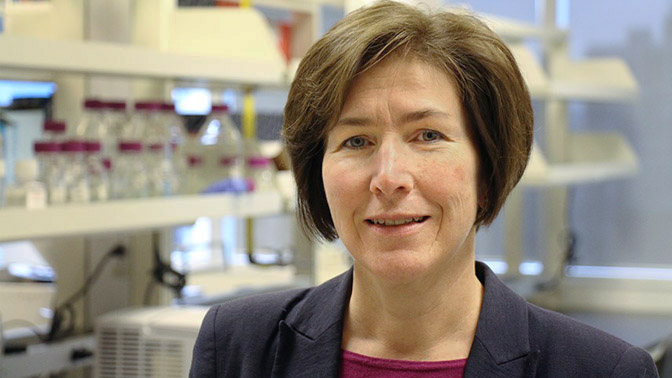
A recent study led by researchers at UHN and SickKids has revealed a potential treatment for glioblastoma, which is the most aggressive and most common brain cancer in adults.
The research team identified a drug-like chemical compound that slows the growth of glioblastoma stem cells—these cells contribute to initiating the cancer and its ability to resist treatment. The study was co-led by Dr. Cheryl Arrowsmith, Senior Scientist at Princess Margaret Cancer Centre and Chief Scientist at The Structural Genomics Consortium (SGC), Dr. Peter Dirks, neurosurgeon at SickKids and Dr. Panagiotis Prinos, senior research associate at SGC and the University of Toronto.
Cancer stem cells, first discovered at UHN in the 1990s, are now recognized to be responsible for the growth and recurrence of many cancers.
“Glioblastoma presents further challenges to treatment because the tumours comprise diverse types of cells. As well, not many drugs can reach the brain because of a physiological 'filter' known as the blood-brain barrier,” says Dr. Arrowsmith.
Elevated levels of a protein called PRMT5 have recently been linked with the severity of brain tumours. PRMT5 belongs to a class of proteins called epigenetic regulators, which have been the focus of intense drug discovery efforts in recent years. Dr. Arrowsmith’s team at SGC has developed at least 50 epigenetic drug-like candidates.
The research team tested 39 epigenetic drug-like candidates on glioblastoma stem cells isolated from 26 patients. Two of these molecules were found to be highly promising. Further testing revealed that they were effective at reducing PRMT5 in glioblastoma stem cells and prevented those cells from growing. One of the molecules, LLY-283, was able to efficiently cross the blood-brain barrier and prevent tumour growth in experimental models.
“These results show that targeting PRMT5 may be an effective therapeutic strategy for patients,” says Dr. Arrowsmith. “We now have a better understanding of how these potential drug candidates halt glioblastoma stem cells from growing and multiplying.”
Currently, no effective chemotherapies exist for children with glioblastoma. The team’s work with pediatric glioblastoma stem cells suggests that targeting PRMT5 may also be an effective strategy for treating glioblastoma in children.
This work was supported by Stand Up To Cancer Canada, Genome Canada, Canadian Institutes of Health Research, Ontario Institute for Cancer Research, The Structural Genomics Consortium and The Princess Margaret Cancer Foundation. T Pugh holds a Tier 2 Canada Research Chair in Translational Genomics. M Tyers holds a Tier 1 Canada Research Chair in Systems and Synthetic Biology. B Haibe-Kains holds a Tier 2 Canada Research Chair in Computational Pharmacogenomics.
Sachamitr P, Ho JC, Ciamponi FE, Ba-Alawi W, Coutinho FJ, Guilhamon P, Kushida MM, Cavalli FMG, Lee L, Rastegar N, Vu V, Sánchez-Osuna M, Coulombe-Huntington J, Kanshin E, Whetstone H, Durand M, Thibault P, Hart K, Mangos M, Veyhl J, Chen W, Tran N, Duong BC, Aman AM, Che X, Lan X, Whitley O, Zaslaver O, Barsyte-Lovejoy D, Richards LM, Restall I, Caudy A, Röst HL, Bonday ZQ, Bernstein M, Das S, Cusimano MD, Spears J, Bader GD, Pugh TJ, Tyers M, Lupien M, Haibe-Kains B, Artee Luchman H, Weiss S, Massirer KB, Prinos P, Arrowsmith CH, Dirks PB. PRMT5 inhibition disrupts splicing and stemness in glioblastoma. Nat Commun. 2021 Feb 12. doi: 10.1038/s41467-021-21204-5.

Dr. Cheryl Arrowsmith, Senior Scientist at Princess Margaret Cancer Centre and Professor at the University of Toronto, is one of the senior authors of the study.

